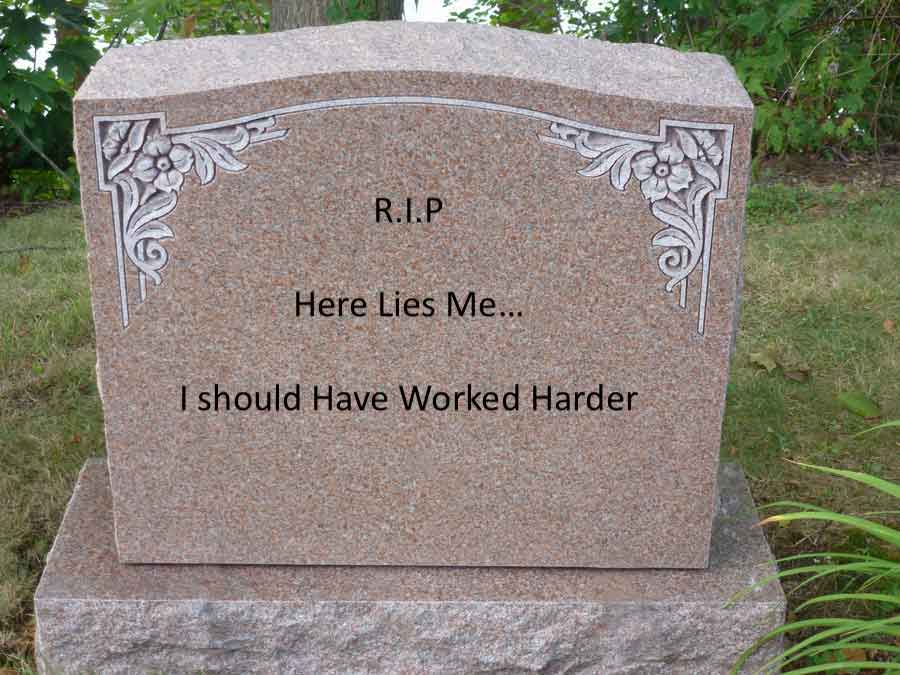
I don’t often think about my death and what might be written as an epitaph on my headstone. In reality though, my belief system dictates that I am unlikely to have a specific burial site, much less a headstone. But if I did have a headstone and I wished to have a few words to sum up my life, the 10 wistful words would be:
“I wish I had spent more time at the office”
On the whole, I am happy and satisfied with my life, no bitterness or major regrets. I work hard but that’s because I enjoy my work; I don’t yearn for more power or wealth; I like my office but I am not in love with it; true, I travel a lot but, in this day and age, the office is a virtual concept anyway. I have a loving family with good circle of friends I can spend leisure time with; and I have personal interests outside of work so I do have a multi-dimensional existence.
So, why make such a seemingly regretful statement? Why do I have this nagging feeling that I am not doing enough? Am I the only one who feels that way? I sincerely hope so, but I suspect I am a member of a fast growing club.
Many of us like to think we are innovative and creative with aspirations to work smarter rather than harder. In reality though, no matter what time-saving methods are introduced through automation and innovation, we seem to be spending more and more time working behind a desk, at the clinic, in the field, on the road, up a ladder, down a shaft, or wherever our chosen professions dictate we should be. And still, we have the feeling that life is passing us by, we have not accomplished worthwhile goals or fulfilled the potential we had shown when we were younger.
I come across many CVs that boast multiple degrees and wide ranges of responsibilities with hardly a mention of accomplishments. When you ask candidates why they are considering changing jobs, they cite lack of challenge and variety! There was a time when people boasted about their houses, cars, bonuses, holidays they had taken etc. Now, we are more likely to talk about the many degrees and courses we have accumulated, how many emails we receive, the number of business trips we take, how long our meetings take, how thick the reports we produce, how many committees we serve on, how many of our holiday entitlement we cannot afford to take and so on; all pointing to the long working hours culture many of us have succumbed to. In Japan staff dare not go home while the boss is still at work, because it is seen as “not working as hard” as the manager, who probably dare not go home earlier than the previous day in case he too is seen to be slacking off.
We have all read articles and blogs by young and self-assured sounding people who tell us how they jumped the corporate ship and decided to live a life of leisure travelling the world or living on a paradise island somewhere. Don’t be fooled; they are the exceptional minority that prove the rule. I travel extensively and the predominant majority of people crowding airports are working people rather than carefree fun seekers departing to hedonistic destinations. If you have any doubts, try commuting during rush hours in Brussels, London, New York, Dubai, Hong Kong or Tokyo.
So, what is happening to us?
No doubt, part of the reason for this relatively new phenomenon is economic; with the growing world population and the ever-increasing life expectancy, our pension plans are unable to fund us comfortably through retirement. So, we find we have to work beyond the usual retirement age of 60 to 65 to boost our pensions. In any case, we generally lead healthier lives than we did in the past, so reaching 65 is nowhere near a state of physical or mental exhaustion. Further, when the world economy is going through tough times like it currently is, there is a collective feeling of guilt and wishing to do “our bit” to make things better.
But I suspect the main reason is “relevance”. We have seen so many people go from full tilt activity and being at the centre of action to being brought by retirement to a sudden stop and shunted to the sidelines like an old rusty steam train being replaced by the new slick high-speed one. Retirement days grow longer and slower and the lack of adrenaline becomes intolerable. With the exception of those who have specific plans of action as to what to do after retirement, many others experience rapid and alarming decline in fitness and alertness.
Sir Steven Redgrave the famous British rower who won 5 consecutive Olympic gold medals before retiring at the 2000 Sydney Olympics, spent more than a year gradually reducing his punishing daily training programme because his body will have reacted badly to the sudden switch off from an Olympian level of training to just one of a keep-fit enthusiast. Thereafter, Sir Steven has kept himself fully occupied in a variety of worthy projects that keep him active and engaged.
In contrast, my own father who owned and ran his own business with energy and drive bordering on the obsessive, suddenly and unexpectedly decided to retire in his mid forties then went on to spend the next 30 years living a life of relative irrelevance and abundance of un-utilised time and energy. Although he lived to his mid-seventies, the sad thing was his wilderness years amounted to roughly the same number of his working years. I often wonder how much more he would have accomplished had he continued to use his considerable skills and talents.
These two examples demonstrate, at least to me, that retirement from one type of activity has to be a gradual shut down followed by powering up of an alternative engagement of the mind, body and soul. The old fashioned method of reaching a notional retirement age, collecting a “Happy Retirement” card and a useless present from employer and work colleagues then going home to sit in front of the TV until the Grim Reaper (Angel of Death) comes calling for your soul, suggests to me a wasted life.
There is a romantic myth, especially amongst men, that they look forward to relatively early retirement so they could spend more time with their families. Very often, families don’t want to spend more time with them anyway. The paradox here is simple, yet very sad. When we are needed to spend time on more altruistic matters, we cannot afford to do so because we are working on material and possibly selfish matters however, when we finally make the time, the need for us to attend to such altruistic matters is no longer there. There is a touching song by the late Harry Chapin called “Cat’s in the Cradle” in which he tells the story of a young boy yearning to spend time playing or hanging out with his father. When the father finally retires and has time on his hands, his son had grown and no longer needed his father any more. I urge you to check it out but get some tissues first:
https://www.youtube.com/watch?v=KUwjNBjqR-c
We all need to be engaged, to feel relevant, to contribute in altruistic as well as material ways, if not for our financial security, then at least for our state of wellbeing.
The current collective panic urging us to top up our pension schemes because the existing mechanism cannot cope with the ageing population is a solution to a relatively smaller problem. I believe we should address ourselves to the much bigger challenge of the many years of possible irrelevance we are likely to experience by planning for alternative careers, yes careers with relevance. I don’t mean playing more golf, learning Swahili or doing the “bucket list” as these things are still egocentric and about self-gratification. I mean doing “relevant stuff”, which is about giving back and contributing to our communities and society in general, if not our immediate families, which will hopefully keep us involved in the mainstream of society.
Otherwise, what is the point of medical science significantly prolonging our life expectancy beyond retirement? We may as well live a sedentary life and ignore our health from the age of 50 onwards, thus enacting the old cliché of the man who is about to be executed by a firing squad requesting a last cigarette.
I am not advocating you call your loved ones straight away and say you will not be coming home anytime soon; you probably are doing more than enough as it is. My simple message is for all of us to plan to work for as long as we are capable of doing so. Of course, we have to accept that the nature and purpose of our work will change in the latter part of our lives but it must still be purposeful and relevant work that makes a positive difference to keep us engaged and relatively healthy, in mind and body, until our not-so-welcome friend with the scythe pays us a visit.
Message to the Grim Reaper:
Don’t bother looking for me on a golf course or in a basket weaving evening class; you are more likely to find me working in an office somewhere. See you not too soon, I hope.


